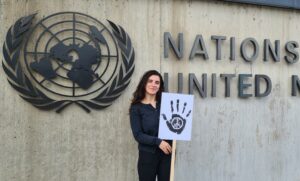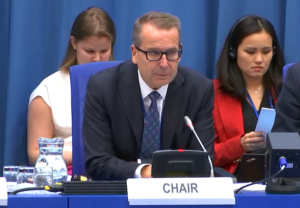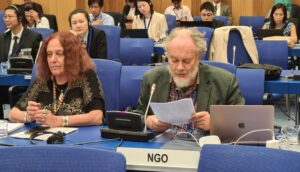States Parties to the Nuclear Non-Proliferation Treaty (NPT), meeting at the United Nations from April 28 until May 9, 2025, were last week encouraged by parliamentarians and civil society representatives to support the adoption of no-first-use policies as an important measure to reduce the risks of nuclear war and to pave the way for mutual nuclear disarmament.
On Wednesday April 30, Rabea Abouras, a parliamentarian from Libya and Member of Parliamentarians for Nuclear Non-Proliferation and Disarmament (PNND), presented Turn Back the Doomsday Clock, a joint statement from parliamentarians around the world to the NPT meeting.
Ms Abouras expressed deep concern about a renewed nuclear arms race along with increased risks and specific threats to use nuclear weapons, and called on governments to “affirm that any threat or use of nuclear weapons is unacceptable as stated by G20 leaders in Bali, and generally unlawful as affirmed by the ICJ,” and that “nuclear armed and allied states should begin phasing out the role of nuclear weapons in their security doctrines, starting with no-first-use policies.”
John Hallam, Co-convenor of the Abolition 2000 nuclear risk reduction working group and Committee Member of NoFirstUse Global, who also presented to the NPT plenary session, highlighted the increased risks of nuclear war and called on States Parties to the NPT to adopt no-first-use policies along with other measures to prevent nuclear war.
“Many analysts myself included, point to explicit Russian nuclear threats, which were never made with the degree of explicitness of recent times during the cold war, as a major factor in the heightening of risk,” said Mr Hallam. “Possibly the single most useful measure would be No First Use. Commonsense would indicate that if nobody uses nuclear weapons first, they will not get to be used.”
Mr Hallam welcomed the fact that “Awareness of the nuclear-risk-reduction and disarmament benefits of No First Use has been gaining attention in multilateral forums including NPT Preparatory committee meetings,” and that “China has formally proposed a No First Use agreement by the NPT Nuclear Weapon States.”
“We urge that No First Use, amongst a suite of other risk reduction postures and policies such as de-alerting and better military-to-military communication, be adopted immediately as a measure that both in theory and in practice might just make the difference between nuclear war as an alarming possibility, and nuclear war as a catastrophic reality.”
See full statements to the NPT Plenary of John Hallam and Rabea Abouras.
Nuclear risks and risk-reduction side event
The ideas and proposals presented to the NPT plenary meeting were discussed in more detail in a side event on May 1 entitled Nuclear risks and risk-reduction, organised by NoFirstUse Global and the Abolition 2000 Nuclear-Risk-Reduction Working Group.
John Hallam, following up on his presentation to the NPT plenary meeting, provided a detailed outline of the risks of nuclear war arising from policies of first use, launch-on-warning and nuclear coercion, with background on many close calls arising from these risks.
Amongst other things, Mr Hallam noted that the increase in nuclear threat announcements over the past few years increases risks of nuclear war, even if such threat announcements are bluffs. This is because they remove and dissolve psychological barriers to actual nuclear weapons use, make accidental apocalypse more possible as they elevate the credibility of spurious launch orders (which in the past have been successfully dismissed by the implementing military officers) and include an element of ‘theological justification’ which removes rational opposition to nuclear war.
Camilla Braito and Ayleen Roy, in a video message to the NPT Prep Com on behalf of Youth Fusion, highlighted that nuclear risks are not science fiction, but are threats to current and future generations. They called for diplomacy and common security to mitigate nuclear risks and foster genuine trust, and that “measures such as dealerting nuclear weapons systems and establishing verification systems are not luxuries, but imperatives… essential steps in preventing catastrophic miscalculations.”
Aaron Tovish, Member of the NoFirstUse Global Coordinating Committee, argued in a video presentation that first-use policies are dated, dangerous and debunked (see also the written version of his presentation).
Regarding their danger, Mr Tovish explained that even if first-use threats are bluffs, such bluffs “contribute to crisis escalation, and at some point, your adversary might begin to wonder whether they ought to believe your threats. If that adversary has a first-use policy, you now have to worry about them “beating you to the punch”. Furthermore, you can surmise that they have the same worry. The result: crisis instability on steroids.”
To those who criticize no-first-use policies as merely declaratory and lack credibility, Mr Tovish outlines a number of measures that can be taken to demonstrate genuine intent and “make your adversaries believe.”
“The pledge is a crucial first step, but actions speak louder than words. For example, if anyone with a role in implementing nuclear policy speaks positively (or nostalgically) about first-use options, they should be publicly reprimanded and removed from any relevant position of authority. All military exercises that involve nuclear arms should be conducted transparently, so that any resort to nuclear force is specifically on an in-kind, retaliatory basis – and preferably de-escalatory in nature. In addition, retaliatory options should not be instantaneous; they should allow time to properly assess the actual impact of a suspected nuclear escalation. If a nuclear-weapon system cannot be de-alerted without making it vulnerable to pre-emption, then it should be eliminated.”
Mr Tovish also notes that nuclear armed and allied states could unilaterally adopt no-first-use policies without diminishing their security, even if adversaries maintain first-use policies. Indeed, their security would be enhanced as they serve as a de-escalation and confidence=building measure in times of high tension.
Mr Tovish makes a number of additional arguments for adoption of NFU policies including that first-use options and threats show bad faith, first-use policy undermines nuclear deterrence, and that the stability of NFU and sole purpose deterrence can provide a solid basis for establishing a nuclear weapon free world.
Photo: Mr John Hallam presenting to a plenary session of the NPT





